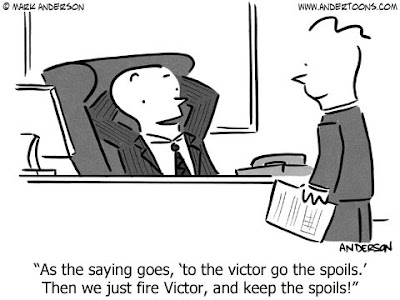That which does no harm to the state, does no harm to the citizen.
In
the case of every appearance of harm apply this rule: if the state is not harmed
by this, neither am I harmed.
But
if the state is harmed, you must not be angry with him who does harm to the
state. Show him where his error is.
—Marcus
Aurelius, Meditations, Book 5 (tr
Long)
I was confused, from early on, about
two specific sorts of behavior that have always seemed to be quite socially
acceptable. Age and experience have only made me scratch my head all the more.
First, people will often measure the
good in life like a balance sheet of debits and credits. They will commit lesser
evils, or permit lesser evils, if they perceive a greater profit from them as a
whole. They believe that a smaller wrong is excused by a larger right. The ends
justify the means.
Second, people will often assume it
is appropriate to hurt the people they think have hurt them. It is completely wrong
to do harm, except when harm has already been done, in which case it is a right
to do harm in return. They believe that violence is excused as a response to
violence. Again, the ends justify the means.
This passage helps me to come to
terms with both of these oddities.
First, there can never be any good
for the whole at the expense of the part, and there can never be any good for
the part at the expense of the whole. It all goes together. At no point should I think that going against Nature supports Nature. It’s a package deal.
Second, there can never be any good
for the first fellow at expense of the second fellow, and there can never be
any good for the second fellow at the expense of the first fellow. It all goes
together. At no point should I think that going against Nature supports Nature.
It’s a package deal.
These actually turn out to be the
same issue, just with different expressions. Nothing ever gets better by making
it worse.
I can’t say, for example, that I am
doing good for the whole community by doing harm to any of its members, and if
someone does do harm to the community, I should correct and improve him,
instead of hurting him out of vengeance.
Though this has long seemed clear to
me, I regularly deal with people for whom the concept seems completely alien.
I once taught at a school where an important
administrator would speak regularly about firing employees. Out of frustration,
I once simply asked him why he was so keen on the idea of taking away people’s
jobs, and whether there might be better ways to solve problems.
“Well, it’s for the good of the
school. I care about the school. It’s like a family to me.”
“If your son does something to annoy
you, do you kick him out of the family? Is it for the good of the family to
hurt some members and not others?”
“Well, that’s different. I have to
live with my family! Don’t be stupid!”
I realized there was no point
reminding him that we have to live with all of the people around us, not only the
ones we prefer.
I suspect that those who think we
can dispose of a few for the many, of some for others, are trapped in an
attitude of “us” and “them”, of constant conflict, where there really is no
awareness of the good of the whole at all.


No comments:
Post a Comment